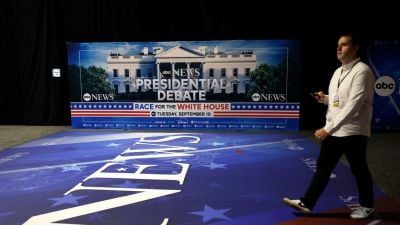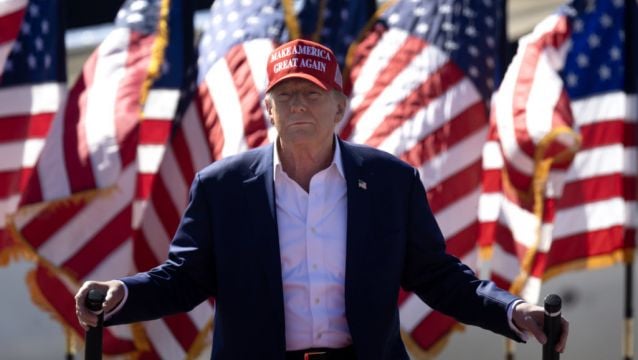Republican former president Donald Trump says he plans to fundamentally alter the US relationship with Nato should he win a second four-year term in November.
On the campaign trail, he has floated sending armed forces into Mexico to battle drug cartels and slapping expansive tariffs on friends and foes alike.
Here is a look at the foreign policy proposals Mr Trump has pledged to advance should he win the 2024 presidential election against US vice president Kamala Harris, his Democratic rival:
Nato, Ukraine and European allies
Mr Trump has said that under his presidency, America would fundamentally rethink "Nato's purpose and Nato's mission".
He has pledged to ask Europe to reimburse the United States for "almost $200 billion" in munitions sent to Ukraine, and he has yet to commit to sending further aid to the eastern European nation if elected.
Mr Trump cut defence funding to Nato toward the latter part of his time in office, and he has frequently complained America was paying more than its fair share.
On the war in Ukraine, he has said he would resolve the conflict even before taking office in January. Though he has put forward few tangible policy proposals, he told Reuters in an interview last year that Ukraine may have to cede some territory to reach a peace agreement.
Two Trump advisers told Reuters in June that they had presented a plan to end the war in Ukraine by conditioning any further weapons aid on Kyiv agreeing to sit down with Moscow for peace talks.
While Mr Trump signalled in early April that he would be open to sending additional aid to Ukraine in the form of a loan, he remained mostly silent on the issue during contentious congressional negotiations over a $61 billion aid package later that month.
China, trade and Taiwan
Mr Trump frequently threatens to impose major new tariffs or trade restrictions on China as well as on some European allies.
His proposed Trump Reciprocal Trade Act would give him broad discretion to ramp up retaliatory tariffs on countries when they are determined to have put up trade barriers of their own. He has floated the idea of a 10 per cent universal tariff, which could disrupt international markets, and at least a 50 per cent tariff on China.
Mr Trump has called for an end to China's most favoured nation status, a status that generally lowers trade barriers between nations. He has vowed to enact "aggressive new restrictions on Chinese ownership of any vital infrastructure in the United States," and the official Republican Party platform calls for banning Chinese ownership of American real estate.
On Taiwan, Mr Trump has declared that it should pay the United States for its defence as, he says, it does not give the US anything and took "about 100 per cent of our chip business," referring to semiconductors. He has repeatedly said that China would never dare to invade Taiwan if he were president.
Mexico and narcotics
Mr Trump has said he would designate drug cartels operating in Mexico as foreign terrorist organisations and order the Pentagon "to make appropriate use of special forces" to attack cartel leadership and infrastructure, an action that would be unlikely to get the blessing of the Mexican government.
He has said he would deploy the US Navy to enforce a blockade against the cartels and would invoke the Alien Enemies Act to deport drug dealers and gang members in the United States.
Civil rights groups and Democratic senators have pushed for the repeal of that act, passed in 1798, which gives the president some authority to deport foreign nationals while the country is at war.
The new Republican Party platform also calls for moving thousands of troops deployed overseas to the US-Mexico border to battle illegal immigration.
Conflict in Israel
After first criticising Israeli leadership in the days after its citizens were attacked on October 7th by the Palestinian militant group Hamas, Mr Trump has said Hamas must be "crushed".
While his rhetoric has been bellicose, he has proposed few policy solutions, besides saying he would be tougher on Iran, which is closely linked to groups classified by the US as terrorist organisations, including Hamas.
Mr Trump also says he would seek to deport all "resident aliens" who are Hamas sympathisers. "Resident alien" is a legal term used to describe US permanent residents, also known as green card holders.
Climate
Mr Trump has repeatedly pledged to pull out of the Paris Agreement, an international accord meant to limit greenhouse gas emissions. He pulled out of it during his term in office, but the US rejoined the accord under Democratic president Joe Biden in 2021.
Missile defence
Mr Trump has pledged to build a state-of-the-art missile defence "force field" around the United States. He has not gone into detail, beyond saying that the Space Force, a military branch that his administration created, would play a leading role in the process.

In the Republican Party platform, the force field is referred to as an "Iron Dome," reminiscent of Israel's missile defence system, which shares the same name.
World War Three
Mr Trump has frequently warned that there will be a third world war if he does not win the election, a line that has become a central part of his stump speech in the final months of the campaign.
"I'm telling you, and I've made a lot of predictions and this is not a prediction because it's so bad. I don't want it to be a prediction. We're heading into World War Three territory," Mr Trump said during a Fox News town hall in early September.
The former president often references Russia's invasion of Ukraine, the conflict between Israel and Hamas and ongoing tensions between Taipei and Beijing when making that prediction.







